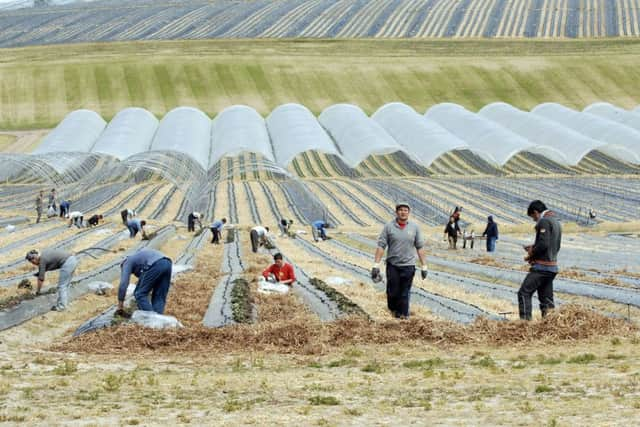Scots fruit farmers travel to Bulgaria to seek workers
and live on Freeview channel 276
A lack of fruit-pickers have led to concerns over crops rotting in the fields and price rises for customers, according to a report in The Courier.
Growers have warned that failing to stem the labour shortages could devastate the £100million-a-year Scottish soft fruit industry, which is centred around the east coast, including Fife and Angus, as well as Perthshire.
Advertisement
Hide AdAdvertisement
Hide Ad

Uncertainty surrounding Brexit and better job opportunities in Eastern Europe have dented the workforce, according to farmers.
Tim Stockwell, of Barnsmuir Farm near Crail in North East Fife, is about 10% short of the 350-strong team needed this year for picking strawberries and raspberries, the newspaper said.
Mr Stockwell told The Courier: “I went over to Bulgaria to help recruit people, to do a presentation there for our farms.
“That did help but it still looks like we’re going to be short. It’s the first time I’ve been, but I do know of other farms going over there.”
Advertisement
Hide AdAdvertisement
Hide AdThe farm paid for workers’ flights, which can cost up to £250 between Scotland and Bulgaria, and lent them money “in desperation really to get people on the farm rather than losing crop,” Mr Stockwell said.
He said: “It’s easy to blame it on Brexit and yes I think that has undoubtedly made the situation worse, but also we are finding that a lot of Bulgarian and Romanian people, they don’t want to travel as much as they used to, they are getting better jobs in their own country.
“We don’t find any Polish really come to us, very few. So it’s looking for a new pool of people to draw from for what we need.”
William Houston, general manager of Angus Growers, a group of 18 producers mainly in Angus, Perthshire and Fife, told the newspaper that the post-Brexit reputation of the UK was partly to blame.
Advertisement
Hide AdAdvertisement
Hide AdHe said Eastern European tabloid newspapers are “building up hysteria about what a terrible place Britain has become”.
Mr Houston added: “If your family at home is asking you ‘what you think you are doing coming to a country like this and look at what the press is saying’, it adds to the pressure.”
Growers are demanding the revival of the UK Government’s seasonal agricultural workers’ scheme (SAWS), which was dropped in 2013 by then Home Secretary Theresa May.
The scheme would allow non-EU workers to come to Britain temporarily for farming work.
Advertisement
Hide AdAdvertisement
Hide AdMr Houston they were promised clarity by Environment Secretary Michael Gove by the end of March, but that has now been pushed back to the end of September, The Courier reported.
“We are at the mercy of labour, much more than the rest of farming,” he said.
Stephen Gethins, the SNP MP for North East Fife, said the uncertainty of Brexit is “already having a huge impact on local farms” and a new seasonal workers scheme is vital to “ensure our food is not being left to rot in the fields”.
“This is a huge issue and the UK Government is failing to give the farming industry any answers,” he said.
Advertisement
Hide AdAdvertisement
Hide AdKirstene Hair, the Tory MP for Angus, said she has been demanding the UK Government resurrects SAWS as labour shortages reach a “critical point for this iconic British industry”.
A UK Government spokesman said: “Defra and the Home Office are working closely to ensure the labour needs of the agriculture sector are met once we leave the EU.
“We have been clear that up until December 2020, employers in the agricultural and food processing sectors will be free to recruit EU citizens to fill vacancies and those arriving to work will be able to stay in the UK afterwards.”
